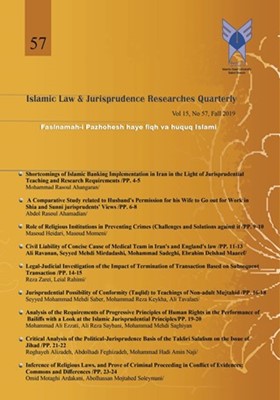Shortcomings of Islamic Banking Implementation in Iran in the Light of Jurisprudential Teaching and Research Requirements
Subject Areas : Private law
1 - Professor, Department of Islamic Law and Jurisprudence, Tehran University, Tehran, Iran
Keywords: Banking, Requirements, Jurisprudential rules, education, Shortcomings,
Abstract :
The necessity of Islamic banking is clear to all today, because the impact and the role of banks are so significant in economic aspects and indeed sometimes it leads to economic behavior of the mass to become truly religious; then, they require banks to perform according to religion and jurisprudential legislation. While the attempts in this regard are considerable and worthy of appreciation, they come across challenges in terms of the education of jurisprudential rules and issues such as superficiality of teachings, lack of attempt to make teachings inclusive, personalization behavior, and the lack of a robust basis upon strong and integrated thinking and philosophical pillars. Sometimes, during a time span, the enthusiasm in implementing Islamic banking is completely tangible, while some other times, there is no attempt. Investment in relevant studies also follows the same path; sometimes a bulk of fund is allocated for such studies and some other times the fund reaches the least possible amount. As a result, teaching jurisprudential issues deeply and inclusively, in addition to emphasizing the research must stand upon a fixed and unchanged foundation, and follow an ascending and continuous line. Only in such conditions, along with solving other problems, it is hopeful that Islamic economy is executed in the manner that bank contracts do not solely remain in the formal mode any more.
یادیپور، مهدی، (1389)، مقدمهای بر حقوق و اقتصاد، انتشارات دانشگاه امام صادق(ع)، تهران.
_||_Holy Quran
Ameli, H. (1994). Ma’aalem Al-Osul. Qom: Esmaeilian Publication.
Ansari, Morteza. (1984). Serat Al-Nejat. Qom: Baqeri Publication.
Eraqi, A. Z. (2001). Hashiah Al-Makaseb. Qom: Ghafour Publication.
Hirvand, A. (1987). Toseye Eqtesadi. Tehran: Molavi Publication.
Horr Ameli, M. (1990). Vasa’el Al-Shi’a. Qom: Aal Al-Bayt Publication.
Jorjani, A. (1907). Sharh Al-Mawaqif. Egypt: Al-Sa’adah Publication.
Khoei, M. T. (1994). Al-Shorout ow Al-Eltezamat Al-Taba’eyah fi Al-Oqood. Beirut: Daar Al-Movarekh Al-Arabi.
Khoei, S. A. (1950). Ajwad Al-Taqrirat. Qom: Islamic Sciences.
Khoei, S. A. (1990). Menhaj Al-Salehin. Qom: Mehr Publication.
Khoei, Seyed Abulqasem. (1992). Al-Masayel Al-Montakhabah Al-Ebadat wa Al-mo’amelat. Qom: Mehr Publication.
Makarem, Naser. Barresi Toroq Farar az Reba. Qom: Madreseh Amiralmomenin Publication.
Mir Moezi, N. (2007). Ravesh Falsafeh Eqtesad Eslami. Islamic Economics, 7(27), 45-65.
Momen, M. (1999). Tasdid Al-Osul. Qom: Modaresin Publication.
Mousavi Bojnourdi, S. H. (1998). Al-Qawa’ed Al-Feqhiyah. Qom: Al-Hadi Publication.
Mousavi Khomeini, S. R. (2001). Ketab Al-Bey. Qom: Imam Khomeini's Works Publication.
Mousavi Khomeini, S. R. (2001). Tahrir Al-Vasilah. Qom: Dar Al-Elm Publication.
Nouri, Hosein. (2000). Mostadrak Al-Vasayel. Qom: Al Al-Bayt Publication.
Tabatabaei Yazdi, M. K. (1994). Al-Orwat Al-Wosqa. Qom: Mehr Publication.
Taftazani, M. (1988). Sharh Al-Maqased. Beirut: Alam Al-Ketab Publication.
Tousi, M. (1996). Tahzib Al-Ahkam (4th ed).Tehran: Dar Al-Ketab Al-Islamiyah

